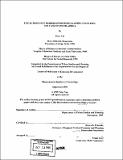Local resource mobilization in developing countries : the case of South Africa
Author(s)
Vaz, Peter, 1963-
DownloadFull printable version (14.57Mb)
Other Contributors
Massachusetts Institute of Technology. Dept. of Urban Studies and Planning.
Advisor
Karen R. Polenske.
Terms of use
Metadata
Show full item recordAbstract
The efficient and equitable provision of public services in a country crucially depends on the allocation of taxing, spending, and regulatory functions among different governmental levels and on the structure of intergovernmental transfers. Using fiscal-federalism, economic-efficiency, and equity principles, I identify appropriate measures for restructuring these intergovernmental fiscal arrangements in developing countries and apply them to a single case, South Africa. My central research question is: Given that South Africa is undergoing a shift from a high degree of centralization to decentralization, what is the "proper" design of this decentralized system and how can the government implement it under particular legal, institutional, administrative, and political constraints? Throughout my study, I focus on the key concept of equity -- an important constitutional objective in South Africa in designing this system. Local government has major responsibility for the provision of basic services. The recent geographic decentralization in South Africa aims at enabling municipalities to generate sufficient revenue for providing these services equitably to their constituents. I analyze the historical and current structure of local government, and recommend its reform so that it is feasible from a fiscal and administrative viewpoint, while simultaneously fulfilling democracy and representation objectives. I examine the options that the newly amalgamated and created municipalities could use to achieve incremental local-revenue enhancement for establishing sustainable service delivery. Specifically, I first estimate the capital and operating costs of providing different levels of service. I then consider the implications of these costs, together with nationally set policies, for municipalities in terms of the choice of service level as well as the available financing mechanisms. Although South Africa basically follows the fiscal-federalism principles of efficiency and equity in assigning revenue responsibility to local government, it needs to consider the reform of existing revenue sources in order to exploit their potential fully. Given that municipalities cannot meet the existing fiscal gap by reducing expenditures or increasing revenues in the short run, they need a well-designed system of intergovernmental transfers. I evaluate the present transfer system and develop alternative models that the national government can consider for the system of operating and capital transfers needed as it phases in local-revenue enhancement. The main contribution of my study is to provide an integrated approach to looking at decentralization system design in the context of a single country -- to which little attention has been paid. Most analysts focus separately on the different system-design components -- local government structure, expenditures, revenues, and intergovernmental transfers -- without discussing the linkages among them. Using South Africa as a case study, I demonstrate the importance of viewing system design as an integrated piece. In addition, I conduct an initial examination of the implementation process, which has also received very little attention in the literature. Thus, I highlight the need for a comprehensive decentralization reform strategy that prioritizes reforms, is phased in gradually so as to gain political acceptance and not overwhelm local government capacity, coordinates the various agencies involved with the process, and pays heed to implementation.
Description
Thesis (Ph.D.)--Massachusetts Institute of Technology, Dept. of Urban Studies and Planning, 1999. Includes bibliographical references (leaves 221-232).
Date issued
1999Department
Massachusetts Institute of Technology. Department of Urban Studies and PlanningPublisher
Massachusetts Institute of Technology
Keywords
Urban Studies and Planning.